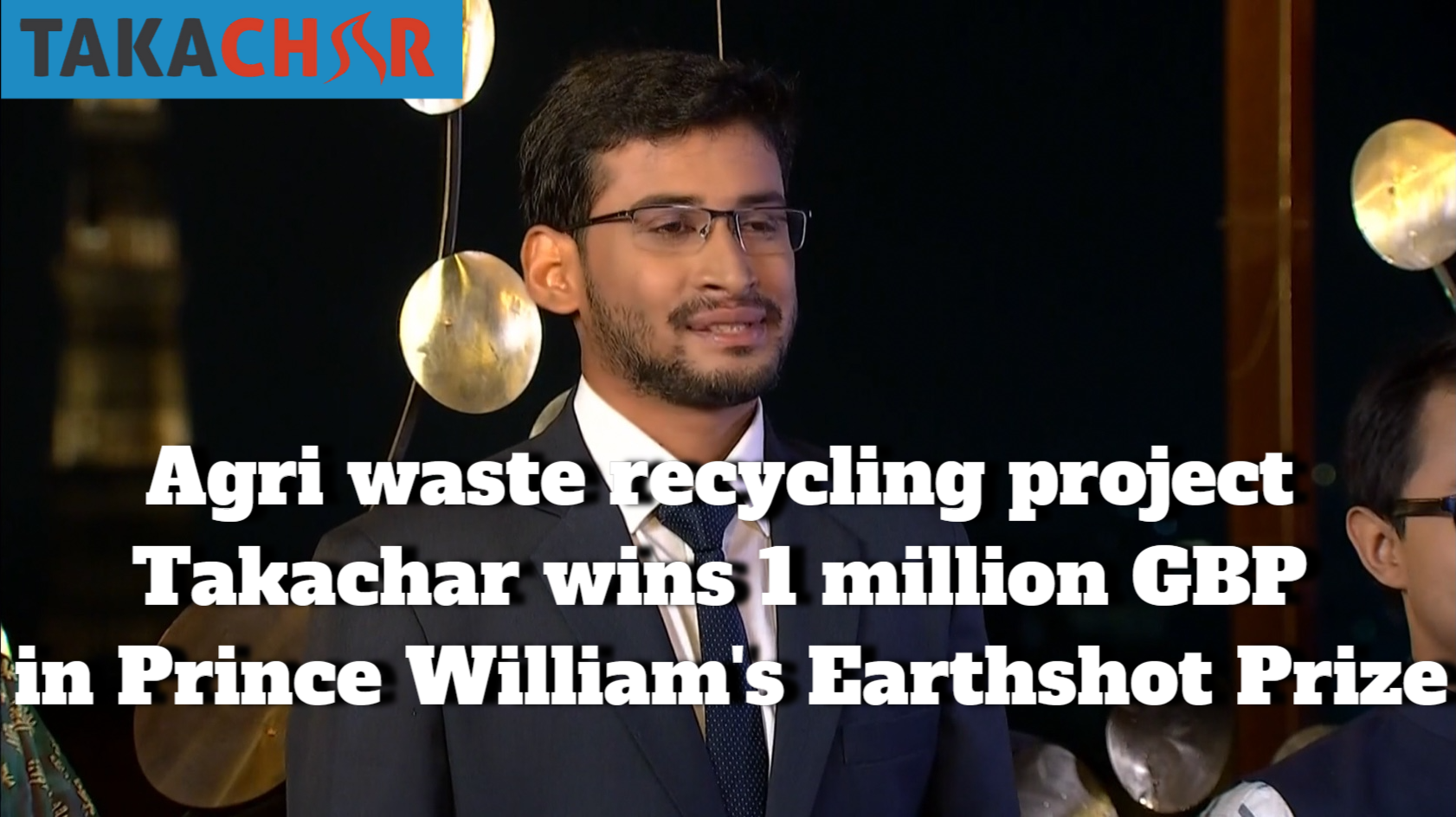One million pound was awarded to Vidyut Mohan and Takachar after developing an inexpensive technology to turn crop residues into marketable bioproducts. It was one of five global winners of Prince William’s prize to honor those working to protect the environment. Nominations for the competition will open in January of next year, with the $1 million prize traveling to the United States in 2022. Sir David Attenborough and Shakira were among the judges who narrowed the field to 15 finalists.
Key Highlight:
Takachar, led by Vidyut Mohan, won the GBP 1 million prize in the “clean our air” category for its low-cost technological innovation to convert crop residues into marketable bioproducts.
At a gala award ceremony on October 17 in London, an agricultural waste recycling project run by a Delhi-based entrepreneur was named one of the winners of Prince William’s inaugural Earthshot Prize, dubbed the “Eco Oscars.”
Takachar, led by Vidyut Mohan, won the GBP 1 million prize in the category of “clean our air” for its low-cost technological innovation to convert crop residues into marketable bio-products.
Prince William, the Duke of Cambridge, created the award to recognize those working to protect the environment, and it went to five people from around the world.
“The clock is ticking. While a decade may seem insufficient, Prince William noted that “humanity has an outstanding record of being able to solve the unsolvable,” in a recorded message played at the ceremony, which was broadcast on the BBC and attended by celebrities and featured performances Ed Sheeran and Coldplay.
To help improve air quality, Takachar was named a winner for its technology that reduces smoke emissions by up to 98 percent, resulting in a five-year increase in life expectancy for the affected population.
They say if they scale it up, it could reduce carbon dioxide emissions by a billion tonnes per year, which is why they say “a win for India’s farmers will be a win in the fight against climate change”. To make the technology more affordable and accessible to farmers in more remote areas of the country, Takachar has developed an attachment that attaches to tractors in those locations. Crop residues are converted into marketable bio-products like fuel and fertilizer by the machine,” the Earthshot Prize says about the winning project.
According to the report, we produce $120 billion in agricultural waste each year, which adds: Often, farmers will burn the crops they can’t sell, endangering both human health and the environment in the process. Life expectancy has dropped by a decade in some areas because of the air pollution caused by burning agricultural waste. Each year, in the fields surrounding New Delhi, this scene is re-enacted. The air is thick with smoke from man-made fires, endangering the health of the residents. Vidyut Mohan is one of their number. Takachar, his social enterprise, is dousing the flames. By 14-year-old Tamil Nadu schoolgirl Vinisha Umashankar, this project was up against another Indian finalist, Takachar.
No celebrities traveled to London for the ceremony, and no plastic was used in the stage construction. The global broadcast connected the five winners to the eco-friendly awards ceremony.
Actress Emma Watson walked the green carpet in a dress made from ten different Oxfam dresses, asking guests to “consider the environment” when dressing.
The Earthshot Prize takes its name from President John F. Kennedy’s 1960s “Moonshot” goal of landing a man on the moon within ten years.
A total of £1 million will be given away every year for the next ten years to five projects that are tackling the world’s environmental issues.
The inaugural winners were chosen from a shortlist of 15 by a panel that included broadcaster Sir David Attenborough, actress Cate Blanchett, and singer Shakira. The winners were crowned on December 7th.
Costa Rica won the “protect and restore nature” category with a program that paid local citizens to restore natural ecosystems, which resulted in a resurgence of the rainforest in Costa Rica’s country.
The “revive our oceans” category was won by a project run by two best friends who are growing coral in the Bahamas in order to restore the world’s dying coral reefs.
The “build a waste-free world” category was won by an Italian waste-busting project from Milan, while the “fix our climate” category was won by a renewable energy project to make hydrogen by splitting water into hydrogen and oxygen from Thailand, Germany, and Italy.
In recognition of their achievements, each winner received an exclusive medal made from recycled materials and designed by award-winning Dutch artist Christien Meindertsma. The medal was inspired by the iconic ‘Earthrise’ photo taken by the Apollo 8 mission in 1968.
A global alliance of philanthropies, NGOs, and private sector companies will help scale the solutions of all 15 finalists as part of the Earthshot Prize Global Alliance.
Earthshot Prize nominees will be announced in January 2022 at a ceremony in London concluding with the announcement that the award will travel to the United States.
Indeed prestigious that Indian company Takachar's "Clean the air" recycling project is among the 5 awardees at the inaugural Earthshot Environment Prize. Our initiatives being recognized globally is a testimony of our efforts towards fostering environmental consciousness.
— Vijayasai Reddy V (@VSReddy_MP) October 19, 2021
EARTHSHOT PRIZE 2021: Vidyut of Takachar India wins £1 million Earthshot Prize for Agricultural Waste Recycling. Other winners are Germany, Milan, the Bahamas and Costa Rica🌍👏🌍👏 pic.twitter.com/1bWW9k7weJ
— Ramona Karoor (@RamonaKaroor) October 18, 2021
'Takachar' one of the incubatees of @BIRAC_2012 supported Clean Energy Intenational Incubation Centre has won the debut edition of the prestigious Earthshot prize, 2021 under the “Clean our Air” category
— DBT-BIRAC (@BIRAC_2012) October 18, 2021
Read more: https://t.co/80vivWe7mB@DBTIndia @RenuSwarup @BiomassTakachar




